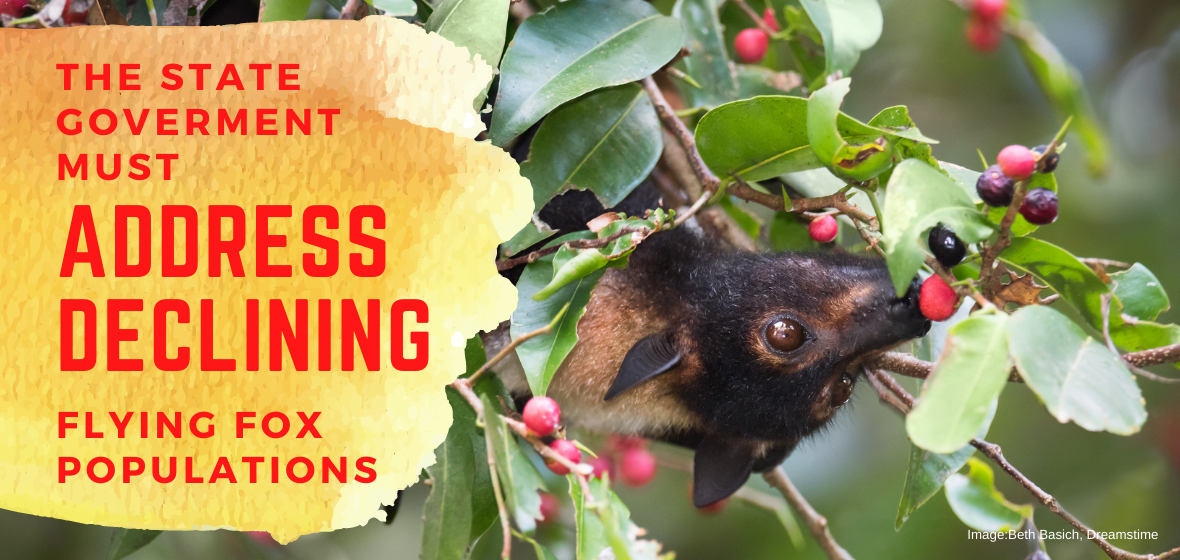14 October 2021
Today sees the release of a landmark report highlighting the impacts of the Queensland Government’s Flying Fox Roost Management laws. Half of all flying fox species in Queensland are listed as threatened species, but the current laws allow for potentially harmful dispersals and disruptions to roosts with no environmental assessments at all.
‘Along with the insights on roost management, the carefully researched Flying-Fox Roost Management Reform for Queensland report provides a clear direction of how to correct the current flying fox management strategies to arrest the decline in flying fox populations, and the report is strongly supported by Wildlife Queensland,’ said Des Boyland, Wildlife Queensland’s Policies and Campaigns Manager. ‘Furthermore, the report also addresses various misunderstandings and misconceptions that have posed barriers to coexistence over time.’
As this landmark report was released, the Australian Government also released a proposal to axe 184 recovery plans from the federal legislature, abolishing any requirement to recover populations of threatened species and effectively walking away from their legal responsibilities to prevent extinction and biodiversity loss. Included among the scrapped recovery plans is the Spectacled Flying Fox Recovery Plan, despite this endangered species being a keystone pollinator and seed disperser for the Wet Tropics World Heritage Area.
Cairns and Far North Environment Centre facilitated the gathering of First Nations Australians, conservation groups, animal rights groups and land managers across Queensland to call for change.
‘United, we are calling for the Queensland Government to have implemented a new framework for roost management and have it operational by December 2022. Additionally, we are calling for the Australian Government to keep all recovery plans and to properly fund the recovery of threatened species to reverse the current extinction trend.’
The report by the Environmental Defenders Office and Cairns and Far North Environment Centre provides key recommendations to the State Government to establish a modern framework. With case studies from First Nations Australians, scientists, conservationists and wildlife carers, the report demonstrates the impact of the laws on the spectacled flying fox (Pteropus conspicillatus), which may now require relisting as critically endangered. The species is on an extinction pathway, and current laws are increasing stressors, rather than acting for its recovery.
‘The spectacled flying fox is not the only threatened species in Queensland. In South East Queensland, three flying fox species navigate the night sky — the black, the little red and the vulnerable grey-headed flying fox,’ adds Boyland. ‘Grey-headed flying foxes are distributed along Australia’s south-eastern coastline. Only a small portion of this range is occupied at any one time as this species travels over 60 km foraging for food, pollinating various plant species and dispersing seeds along the way. No wonder they have been called flying gardeners, as they perform priceless environmental services. Yet these vulnerable species are subject to Damage Mitigation Permits (DMPs).’
The essential role flying foxes play in ensuring biodiversity and regeneration of our forests cannot be overstressed. UNESCO sites, such as the Wet Tropics World Heritage Area and Gondwana Rainforest Reserves, rely on flying foxes for pollination and dispersal services. Now, groups across the state are working for the recovery of flying foxes and calling for state and federal governments to ensure they are also acting in the best interests of conserving these essential species.
‘It could be construed that the Palaszczuk Government’s recent Flying-Fox Roost Management – Local Government Grants Program indicates a level of concern for flying fox welfare,’ says Boyland. ‘However, commitments given years ago have not been delivered upon. The state government needs to do more. Repealing the local government authority to manage roosts and stopping the issuance of DMPs would be a step in the right direction.’

